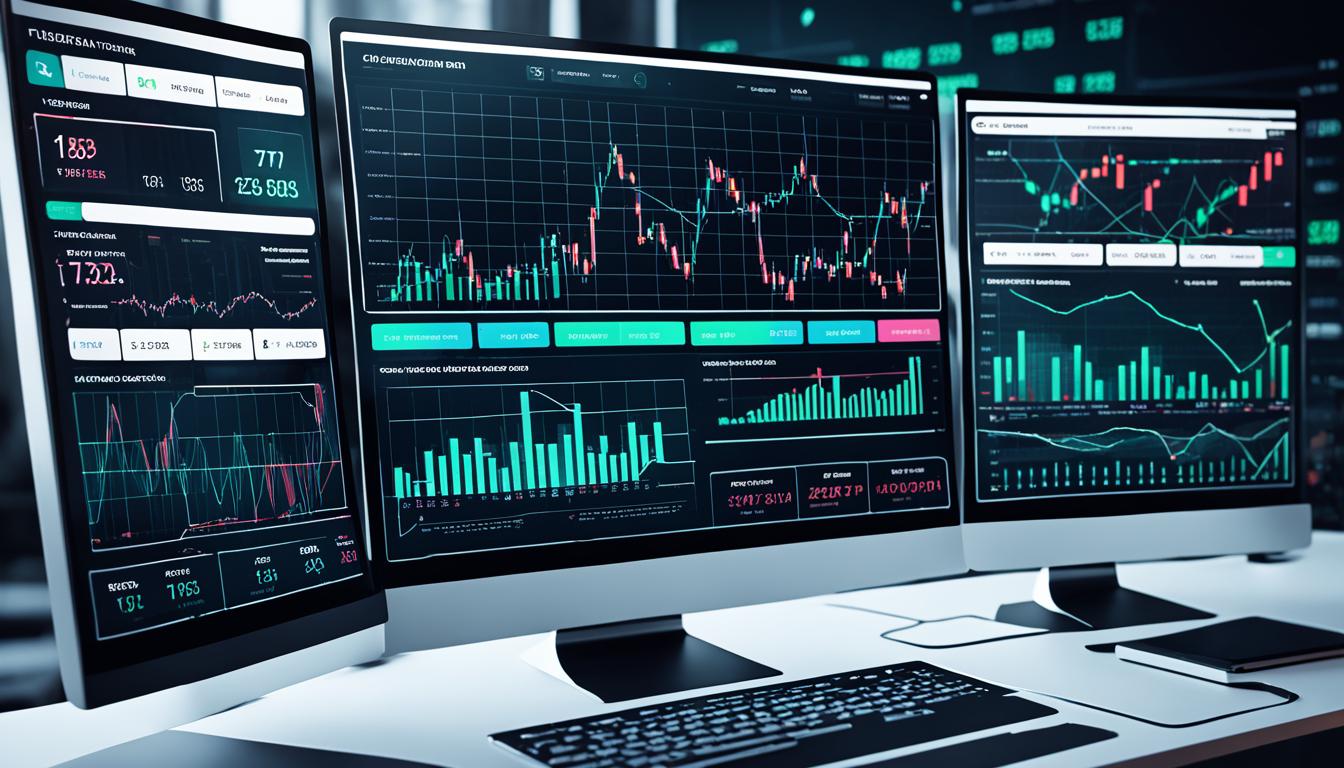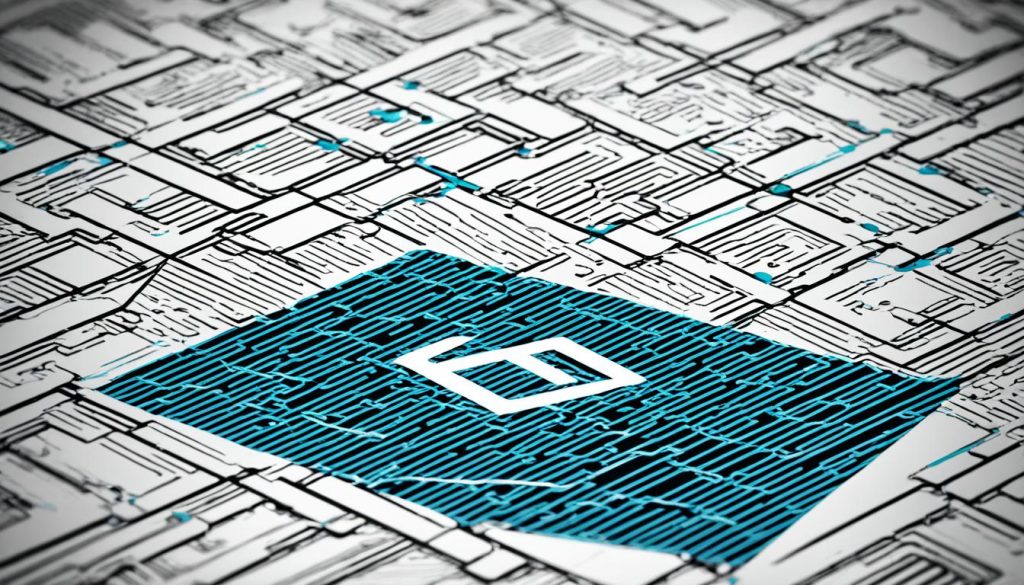Blockchain, also known as decentralized ledger technology, is changing the game in forex trading. It brings a new level of openness and speed to the table. This tech cuts down on costs and makes currency exchange simpler.
Blockchain’s key features like immutability, decentralization, and smart contracts are reshaping forex trading. These qualities are making a big impact on how trading works.
Key Takeaways
- Blockchain technology enhances transparency in forex trading.
- Increased security and reduction in fraud are noticeable benefits from utilizing blockchain solutions for forex industry.
- Forex trading with blockchain helps streamline processes and reduce costs.
- Immutability and decentralization are pivotal attributes of blockchain that transform forex trading.
- Potential for smart contracts can automate various forex trading operations, providing greater efficiency.
Understanding Blockchain Technology
Blockchain technology is changing the game in many fields, especially in forex trading. To grasp its impact, we need to know what blockchain is and its main features.
What is Blockchain?
Blockchain is a digital ledger that spreads across many computers. It records all transactions in a chain of blocks. This makes it secure and unchangeable. In forex, blockchain offers a clear and safe way to trade without middlemen, cutting down on risks.
Key Features of Blockchain Relevant to Forex Trading
Blockchain has features that make it great for forex and integrating with the market:
- Decentralization: It doesn’t need a central authority, which lowers risks.
- Immutability: Once a transaction is in the ledger, it can’t be changed, keeping a permanent record.
- Transparency: Everyone on the network can see the ledger, building trust and accountability.
These features boost the security, follow rules, and strength of forex trading platforms. They show how blockchain is reshaping forex trading.
How Blockchain Differs from Traditional Databases
Traditional databases are central, making them easy targets for fraud and data breaches. Blockchain spreads data across many nodes, making it hard to change records. It also uses cryptography to keep data safe and whole.
Using blockchain in forex offers a secure and clear trading space. It cuts down on fraud and helps follow rules better.
Blockchain’s decentralized nature also means lower costs and faster transactions. This big change is showing how blockchain is altering forex trading and the future of finance.
The Role of Blockchain in Forex
Blockchain technology is changing the game in forex trading. It makes transactions more transparent, secure, and efficient. This is key for traders and financial groups looking to get the most out of blockchain in forex.
Enhancing Transparency in Forex Transactions
Blockchain makes forex transactions more transparent. Every deal gets recorded on a permanent ledger. This means everyone can check and confirm transaction histories instantly.
This transparency builds trust and accountability. It makes traders and brokers more confident in the market.
Improving Security and Reducing Fraud
Blockchain boosts forex security by fighting cyber threats and fraud. Each deal is encrypted and linked to the last one, making the chain hard to fake. This means less fraud in forex trading, protecting traders and financial groups.
Streamlining Processes and Reducing Cost
Blockchain automates and digitizes forex trading steps, cutting costs. Old-school forex deals go through many hands and take a long time to settle. Blockchain speeds up settlement, reducing costs and making trading smoother from start to finish.
Benefits of Blockchain in Forex Trading
Blockchain technology is changing the way forex trading works. It brings many benefits that make trading faster and more reliable. These benefits include quicker transactions and lower costs, making trading better overall.
Increased Transaction Speed
Blockchain makes forex trading faster by cutting out middlemen and using real-time processing. This means trades settle almost instantly. This quickness is key in the fast-moving forex market.
It helps traders make the most of market chances right away. This boosts trading efficiency and the ability to act fast on market changes.
Enhanced Data Integrity
Using blockchain in forex trading also means better data integrity. Every trade is recorded on a secure ledger that can’t be changed. This makes trading data trustworthy and free from errors.
This trust helps traders and firms work better together. It creates a safer place for trading.
Reduction in Operational Costs
Blockchain makes forex trading cheaper by automating trade settlements and cutting down on errors. These savings help traders stay competitive. They can use their money better.
Blockchain also helps reduce fraud and errors, saving even more money. This makes forex trading more cost-effective.
By using blockchain, forex traders and firms can do better and stay ahead in the changing market.
Blockchain Technology Impact on Forex Market Dynamics
Blockchain is changing the forex market in big ways. It’s making trading currencies easier and more open for everyone. This means even smaller companies and individual traders can join in.
Blockchain makes sure transactions are accurate and transparent. This builds trust among traders. It also keeps a secure record of all trades, making the market safer.
Blockchain is also making it easier to follow rules in forex trading. With clear transactions, following global financial laws gets simpler. This could lead to more traders joining the market worldwide.
Blockchain is cutting costs and making things more efficient in forex. It uses smart contracts to automate tasks and cuts out middlemen. This means cheaper and faster trades.
- Increased market inclusivity
- Enhanced transparency and security
- Improved regulatory compliance
- Cost reduction and efficiency gains
Blockchain is changing how forex works for the better. It’s bringing in new tech innovations. This is making the trading world stronger and fairer for everyone.
Blockchain Innovations in Forex Trading
Forex trading is changing fast with blockchain innovations. Decentralized Finance (DeFi) is a big step forward. It lets people trade forex easily, without needing traditional banks. This makes trading more open and less controlled by a few.
Decentralized Finance (DeFi) and Its Influence
DeFi uses blockchain to create a new kind of finance. In forex, it makes swapping currencies, lending, and borrowing easy. It cuts out middlemen, lowering costs and making things more efficient.
- Inclusivity: DeFi lets people from all over the world trade forex.
- Lower Costs: Without middlemen, DeFi reduces fees.
- Transparency: All deals are clear on the blockchain.
- Security: Blockchain makes forex trades safe.
Smart Contracts and Automated Trading
Smart contracts are contracts that run by themselves. In forex, they can set and follow trading rules without people. This makes trading faster and more reliable.
- Automation: Smart contracts set trades based on rules.
- Reduction of Human Error: Automated trading cuts down on mistakes.
- Speed: Deals are made fast, cutting down on wait times.
- Enforcement: Smart contracts make sure rules are followed, cutting down on disputes.
| Aspect | Traditional Forex Trading | Blockchain Innovations |
|---|---|---|
| Accessibility | Limited to banks and financial institutions | Open to anyone with internet access through DeFi |
| Transparency | Opaque and prone to manipulations | Enhanced due to blockchain’s immutable ledger |
| Transaction Speed | Relatively slow | High-speed with smart contracts |
| Cost | High due to intermediaries | Lower with reduced intermediaries |
| Security | Vulnerable to fraud | Heightened security with blockchain |
Future Prospects: How Blockchain is Changing Forex Trading
Blockchain is changing the game in forex trading. It’s bringing new trends like the tokenization of currencies and more blockchain-based platforms. But, there are challenges too, like scalability issues, legal and regulatory hurdles, and technical problems.
Emerging Trends to Watch
Some trends are shaping the future of forex trading with blockchain. For example, turning traditional currencies into tokens opens up new trading options. Decentralized exchanges (DEXs) are also on the rise, making trading easier and less dependent on big companies. Plus, blockchain networks that work together will make transactions smoother across different platforms.
Challenges and Limitations
There are big hurdles to overcome for blockchain to be widely used in forex. One big issue is scalability, as current blockchain networks can’t handle lots of transactions fast. Legal and regulatory issues also slow things down, as rules vary by country. And, making blockchain work with existing forex systems requires a lot of money and expertise.
Potential for Global Adoption
Even with challenges, the outlook for blockchain in forex is bright. More financial institutions see the value of blockchain for making things clearer, safer, and faster. Work is being done to set common rules for using blockchain in forex, hinting at a future where it’s key to the global financial world.
| Aspect | Current Challenges | Future Potential |
|---|---|---|
| Scalability | Limited transaction throughput | Advanced blockchain solutions like sharding |
| Regulation | Inconsistent legal frameworks | Globally coordinated regulatory standards |
| Adoption | High integration costs | Enhanced institutional collaboration |
In conclusion, blockchain in forex faces challenges, but its global adoption potential is clear. As these issues are solved, we’ll see a more efficient and secure way to trade globally, thanks to blockchain.
Conclusion
As we wrap up our look at blockchain and the forex market, it’s clear that blockchain is changing the game. It’s not just a trend; it’s a big step forward. It makes trading more transparent, secure, cuts costs, and speeds up transactions.
Blockchain does more than just make money. It creates a safer and clearer space for everyone involved. It brings better data integrity and opens doors to decentralized finance and smart contracts. This means the forex market could become more efficient and reliable than ever before.
The use of blockchain in forex is set to keep growing. Even with challenges, new innovations and trends are making blockchain more important. They’re making global currency trading better and more efficient. As we see these changes, it’s clear that blockchain is having a big, positive effect on forex trading.
FAQ
What is Blockchain?
Blockchain is a way to record transactions on a network of computers. It’s decentralized, transparent, and can’t be changed. This makes it different from traditional databases that can be easily altered.
How does blockchain enhance transparency in forex transactions?
Blockchain makes all transactions clear on a public ledger for everyone to see. This builds trust and lowers the risk of fraud or fake transaction histories.
What are the key features of blockchain relevant to forex trading?
Blockchain’s key features for forex trading are decentralization, immutability, and transparency. Decentralization cuts out middlemen and lowers risks. Immutability keeps transaction histories safe from changes. Transparency lets everyone see transaction records.
How does blockchain improve security and reduce fraud in forex trading?
Blockchain’s decentralized nature lowers the risk of single points of failure. Its immutable records stop tampering, greatly reducing fraud chances in forex trading.
What are the benefits of blockchain in forex trading?
Blockchain speeds up transactions, keeps data safe, and cuts costs. It removes middlemen, allowing for quick processing and faster settlements. Each transaction is recorded permanently and can be checked.
What impact does blockchain technology have on forex market dynamics?
Blockchain changes the forex market by making it more transparent, cheaper, and secure. It lets smaller institutions and retail traders join in. Blockchain also helps with rules by making transaction records clear.
How do smart contracts and decentralized finance (DeFi) influence forex trading?
Smart contracts make forex trading more efficient by cutting out middlemen. Decentralized Finance (DeFi) makes forex trading available outside traditional banks. It offers easy currency swaps and peer-to-peer financing.
What future trends should be watched in blockchain and forex trading?
Look out for the tokenization of currencies and blockchain-based forex platforms. These trends show blockchain’s growing role in finance. Watch for improvements in scalability and rules for its wider use in forex trading.
What are the challenges and limitations of integrating blockchain in forex trading?
Challenges include making it scalable, dealing with unclear rules, and technical issues. But, financial institutions are working together to solve these problems. They aim for a more efficient and secure global trading system.






